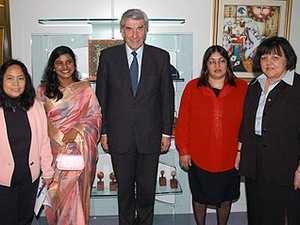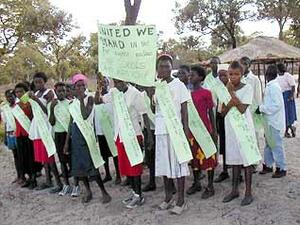Afghanistan Humanitarian Update No. 14
Afghanistan Humanitarian Update No. 14
At a Glance:
- Afghan Forum
- Site Preparations
- Humanitarian Pipeline
- Second airlift for Iran arrives
Afghan Forum
UN High Commissioner for Refugees Ruud Lubbers said Saturday that he hopes the international fight against terrorism will avoid any large-scale displacement, but humanitarian agencies must nevertheless be prepared. Concluding a two-day "Afghan Forum" meeting in Geneva co-chaired by UN Under Secretary General for Humanitarian Affairs Kenzo Oshima, Lubbers also welcomed expressions of financial and other support from several of the 22 participating countries and other organizations. International burden-sharing in the humanitarian effort was essential, he said, noting that neighbouring countries such as Pakistan and Iran - which already host more than 3.5 million Afghan refugees between them - have for years borne an enormous responsibility with little outside help.
Responding to questions from reporters after the meeting, Lubbers said UNHCR had a contingency plan for a worst-case scenario in which up to 1.5 million Afghans could flee to neighbouring states. But he said the goal of the international community should be to try to avoid any large-scale population movements and to get as much help as possible into Afghanistan. "I hope a way will be found in the fight against terrorism to function in such a way in Afghanistan that it does not push big numbers out," he said. "It has to be selective."
"I think it's still possible," he said of minimizing population movements, "but I still have to fear that big numbers will come." He added that an effective international approach would be one that "ends the horrible misery" of the Afghan people - "not add to the misery, but diminish the misery."
Lubbers said he hoped international efforts in the region would also mark the beginning of a sustained political approach that will eventually bring the Afghan people good governance, respect for human rights, and lasting peace and security.
Oshima told reporters that governments had so far responded to a $584 million UN Donor Alert for Afghanistan with commitments of $182 million. He said they had also pledged $28 million to humanitarian agencies outside the UN Donor Alert. In addition, donors announced their intention to allocate an additional $406 million in support for humanitarian assistance in Afghanistan, but most governments had not yet decided how those funds would be channelled. In other cases, he said, the funding would require parliamentary approval.
Site Preparations
The first six sites to house any new influxes from Afghanistan are expected to be ready within the next ten days in North-West Frontier Province - five in Kurram and one in Khyber. Together, the sites will be able to accommodate 60,000 people. Aid workers are working round the clock to ensure that the sites have road access and that water and sanitation systems are either rehabilitated or newly installed.
Site preparation in 14 other sites in the province has begun, and should be completed in a fortnight. The twenty sites, when ready, will be able to receive up to 200,000 people.
UNHCR staff who visited the site at Khyber, close to the border, said they had not seen any sign of population movements towards Pakistan.
In Balochistan Province, UNHCR examined two more sites - one in Pishook, 300 kms south-west of Quetta, and another in Badini, 250 kms north-east of Quetta. Experts who surveyed the site in Pishook - an old refugee camp that still has some 200 refugee families - said it was viable. It sits on a plain and has shallow wells that are still in use. The site at Badini has water, but may not be viable because of access and security concerns.
Humanitarian Pipeline
Nearly 2,000 tents have been trucked to Quetta over the past two days from Karachi, bringing the total on hand in the area to some 4,000. More convoys will arrive in coming weeks as part of an aid pipeline that will eventually result in the provision of 13,300 tents in the Quetta area - enough to shelter up to 100,000 people.
In Iran, meanwhile, a Boeing 747 cargo plane chartered by the United Kingdom landed in the north-eastern town of Mashad early Saturday carrying 878 tents, 300 rolls of plastic sheeting, 250 canvas tarpaulins and 45 rolls of rope. The relief supplies are a donation from the United Kingdom. Saturday's airlift was the second into Iran and the fourth for UNHCR sent to the region in a week.






